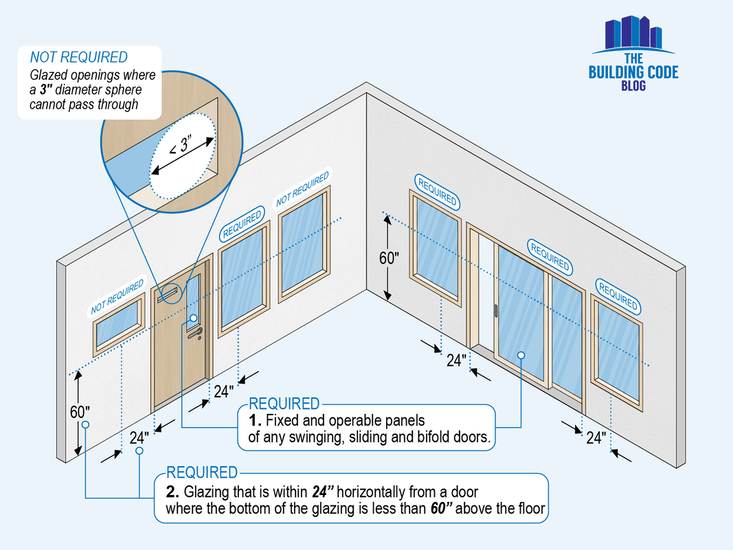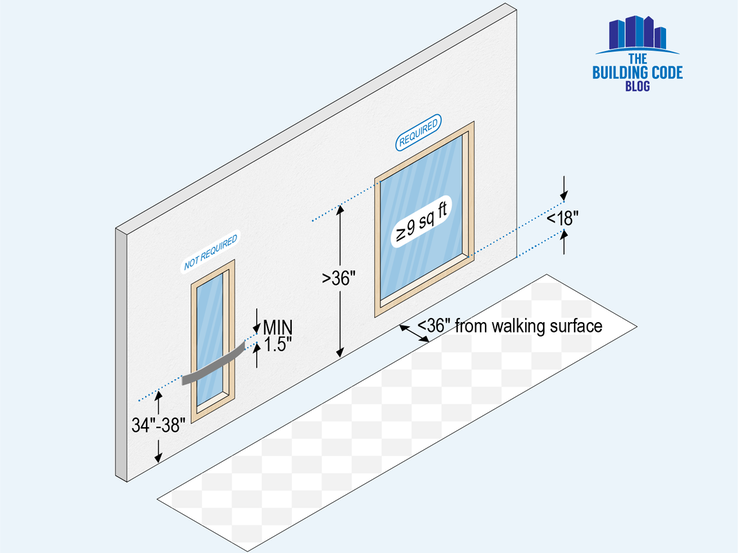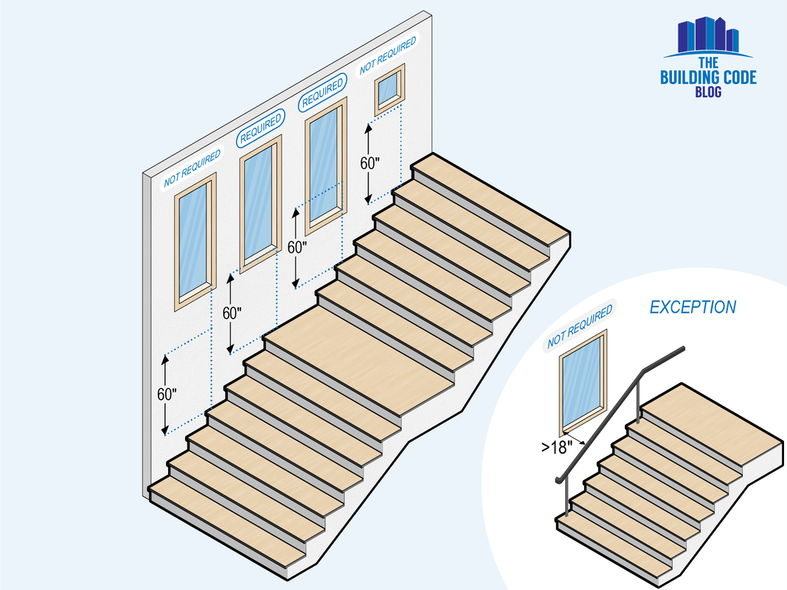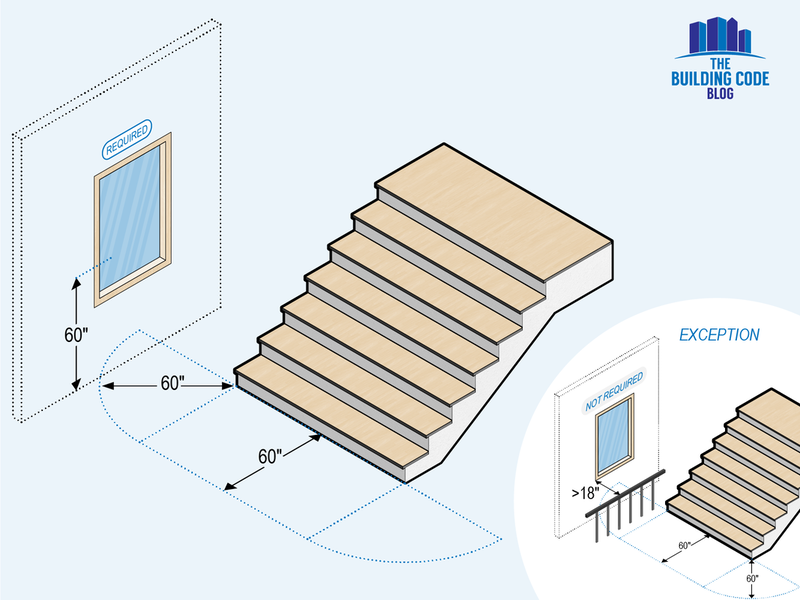
**Updated 2/9/2023 with IBC 2021 Code References and new images!
About twice a year, I receive a question from an architect regarding safety glazing. Where is it required? Can I provide a different type of glass? Is this manufacturer/model acceptable? Without fail, I always end up revisiting the International Building Code (IBC) to review the requirements before answering the question. So in an effort to save me (and hopefully you) time in the future, I have compiled a quick reference guide for safety glazing. All references are to the 2021 IBC.
Practically, safety glazing refers to glass panels or other materials that are manufactured to reduce the likelihood of breaking and to minimize the safety risk if the material does break. From a code compliance standpoint, safety glazing refers to any glazing that meets the requirements of IBC 2406.
Glass panes are the most common safety glazing material, but the IBC also recognizes plastic, glass block, and louvered windows as potential options. The IBC does not provide any requirements for the process used to manufacturer safety glazing, it only provides performance requirements. Therefore, both tempered and laminated glass assemblies can qualify as safety glazing, if they meet the IBC 2406 requirements.
One common misunderstanding is confusing tempered glass with safety glass. As explained below, tempered glass is one type of safety glazing, but not the only type. The building code requirements explained below do not require tempered glass (only safety glass), but tempered glass can be used when safety glass is required.
Glazing in any fixed or operable panels of swinging, sliding and bifold door is considered a hazardous location.


Glazing in any guard, railing, balaster panel and in-fill panel is considered a hazardous location.
Glazing in areas containing hot tubs, spas, whirlpools, saunas, steam rooms, bathtubs, showers and swimming pools where the bottom is less than 60” from the walking surface. There is an exception for when the glazing is more than 60” horizontally from the water’s edge of a bathtub, hot tub, spa, whirlpool or swimming pool.

Glazing near the landing at the bottom of a stairway where the bottom is less than 60” above the landing and within 60” horizontally at an angle of less than 180 degrees from the bottom tread nosing is considered a hazardous location. There is an exception for glazing protected by a guard where the glazing is at least 18” from the guard.

Additionally, glazing located in fire-protection rated or fire-resistance rated glazing installed in fire door and window assemblies is required to be safety glazing.
When safety glazing is required, the most common design option is manufactured glazing panels that are either laminated or tempered. Safety glazing panels are required to be tested to either CPSC 16 CFR Part 1201 or ANSI Z97.1 and must be identified through a label or other means of designation. There is an exception that allow forms of safety glazing other than tempered glass to not be labelled when approved by the AHJ.
When tempered glass is used, the glazing must be identified by a manufacture’rs designation that is, “acid etched, sand blasted, ceramic fired, laser etched, embossed, or of a type that once applied, cannot be removed without being destroyed.”
In retrofit applications, it may not be desirable to replace existing glazing with new safety glazing panels. There are various film products available that can be applied to existing glazing that will satisfy the code requirements for safety glazing. Some examples include products by 3M, Llumar and Gordon Glass.
If using this option, it’s important to determine who applies the label to the glazing once the film is applied. If the installing contractor is applying a label after the film is installed, check with the local authority to verify that this will be acceptable. Since the IBC has fairly stringent requirements on safety for identification of the safety glazing, some AHJs require a permanent label that is etched in to glass.
There are 7 distinct hazardous areas where the IBC requires safety glazing. Technically, any product that meets the requirements of IBC 2406 can be considered safety glazing, but the most common products are tempered and laminated glass. Be sure to verify that the product you select has been tested in accordance with CPSC 16 CFR Part 1201 or ANSI Z97.1
Need assistance on your specific project?
Add Campbell Code Consulting to your team. They are a full-service code consulting and fire protection engineering firm that can help you navigate complex code challenges.
3/3/2021 09:59:46 amWhen applying safety glazing film in required locations, is the film applied to one of both sides of the glazing panel? Thank you!
Tarun Deep 3/18/2021 05:28:45 amHi
I need to know from your expert advice which type of glass i should use on the facade glazing with spas, saunas, steam rooms.
Where one toward outside from the facade of Hotel people can see through outside the view..while sitting inside.
The outer glass will be the Performance Low-e glass with air cavity and inside glass needs to be suggested..where the water droplets or the steam should not stay or condensed .
I hope you understood. my requirement..
Kindly reply back at earliest..
Thanks
Tarun Deep
Dubai
+971568554147
Renovating an existing building in Frederick MD. Do replacement windows need to be tempered if they are below 18 inches at fioor.
Chris Campbell 6/18/2021 02:40:00 pmFeel free to send me an email and we can discuss your specific situation.
7/20/2021 11:01:42 amI want to get some long lasting windows. It makes sense that I would want them to be properly glazed! I can see how that would be a great way to help prevent damage to my windows.
9/2/2021 07:35:38 amThe way you discussed the topic with ease and completeness is really amazing. Thanks for this article!
9/7/2021 08:52:55 amThe simplicity of your presentation is highly-motivating for learning. Please keep it up for your teeming followers.
9/7/2021 09:10:47 amThe facts that have been discussed here are really important. Thank you so much for sharing a great post.
11/13/2021 02:24:08 amThank you for sharing a complete guide. This will be going to help all the internet users who are looking for the same services. To avail the most beautiful windows and also customize windows you can contact Renewal By Andersen Custom Windows, This is the best windows company and they also deal in door services.
Does Missile Impact Resistant glazing qualify as "Safety Glazing"? We have Missile Impact Resistant Glazing at all our exterior windows and doors and i've only found one or the other.
11/30/2021 05:42:33 pmWould someone in this blog please offer me some guidance.
I would like to use a full glass door ( think herculite ) type door of just frameless glass. Door would be hung into wood or steel frame 10mm thickness but 12mm optimal. Safety glass for sure.
Doors would be hinged, with patch fitting single action type hinge, patch fitting lock. Door would not be considered a building main entrance. Interior use, similar to what is offered in Euro markets without a door closer. No overhead concealed, no floor closer and no gravity or tension hinge like shower door hinge. Everyone I communicate with makes reference to NGA/GANA recommendations. I see per the NGA / GANA recommendations glass thickness, size and weights identified for use with overhead concealed closer or floor closer. I did have one company tell me they could offer an assembly with some type of door control such as closer or holder as part of assembly. I understand the safety precautions here and why these requirements are such. I'm hopeful I can locate further specifics on this. Ideally I would like to understand what might permit use of this door without some type of door control. Specifically what codes or requirements apply to a frameless glass door. Let's say I want to use a glass door, 36" X 96" X 1/2" glass in lieu of an interior solid core wood door.(non fire rated of course). Commerical use and or residential use. I'm hopeful one or more of your seasoned professionals here might be able to point me to supporting information on limitations of all glass doors. I'm digging in a bit more then most on this issue because most blow it off as not permitted and call it a day. The challenge for me would be what if I can find some type of additional safety film that is laid up in a way that offer greater safety is glass is broken. Who or where would I go to gain some further insight on potential acceptance. Normally, if working on a project, we would default to the local authority having jurisdiction and governing codes. Perhaps there is a seasoned vet that might enjoy some crazy dialog while offering me some education. Thank you all for reading.
If a glass panel or other material does break, safety glazing is designed to mitigate the resulting risk to people's safety as much as possible. Thank you for this informative article.
1/17/2022 03:58:17 amThis is a very informative—edifying article to all. Thanks a lot! Continue to post!
If you are looking for coupon codes and deals just visit coupon plus deals dot com
I hope someone can answer this question….
Residential Application
I have windows on either side of a sliding Patio door I know the window on the latch side would need to be temp but does the window on the fixed panel side need Tempering as well? Both are within 8” of the Jambs of the patio door. Ive seen it both ways and IBC isn’t addressing that as far as I can tell.
Some say the fixed panel is the safety glazing required for the operation panel and thus the window on the fixed side wouldd not.
Any help woul;d be appreciated
Chris Campbell 1/25/2022 02:12:20 pmIn my opinoin, if one pane of the sliding door is completely fixed and immovable, you would not need to provide safety glazing for the window on that side. Some AHJs may take the opposite interpretation, though.
Zoe Johnson 4/8/2022 11:19:35 pmHi, I am dealing with a building inspector in a renovation that wants the existing windows under 24" to be tempered glass, my understanding is that the height is A. 18" not 24" and B. the glass area has to total 9 Sq ft to trigger this code??
The windows are above 18" and only 12"x24" so I am tempted to balk at the request. She also has no knowledge of ANSI approved safety film applications and is requiring I submit an ICC approval for using that as an alternative to replacing windows with tempered glass. which doesn't sound too horrible except the ICC doesn't really seem to be in the product report testing so I will need to bring her round to one option or another .
are there going to be a bunch of 2-3 year old running around this room if not I don't see any reason to use safety glass for a 1 foot by 2 foot window that's 20-21 inches off the floor esspecially if it's 1 foot tall and 2 feet wide code is below 18 inches if it's more than 2 feet from a door more than 5 feet from a shower , swimming pool , tub or stairs I'm very safety minded when it comes to windows but this lady so too over broard even for me
4/28/2022 02:22:46 amI love this article. This is very well written about safety Glazing. The content you have shared is very elaborative and informative. Love all pictures you have shared in the post as well. Thanks for sharing.. Much needed tips and guides.. really helpful.
4/28/2022 10:33:08 amCan someone tell me,
If safety glazing is required on a window where it is 24” to the edge of the opening but 25” to the glass, from the hinge side of a 3’ interior door. The door swings into the middle of the window opening. The window is perpendicular to the interior door.
Thank you for your reply
5/25/2022 03:01:22 pmThanks for the info about glazing. My brother wants new window films for his home. I'll share this info about glazing and films with my brother.
8/25/2022 12:17:51 pmThank you for sharing this information.
9/7/2022 01:55:46 amSuch an informative article and it is really beneficial for many people, keep up the good work. Thank you so much for sharing.
10/26/2022 06:34:26 amWhen it comes to safety glazing, it's important to choose a specialist. Because, A specialist company will have the experience and expertise to advise you on the best type of safety glazing for your specific application. They will also be able to provide you with a quotation for the work required.
Your blog post on safety glass is a concise and informative guide for anyone looking to understand its importance in building regulations. The detailed explanations of different types of safety glass, such as tempered and laminated glass, help readers comprehend their unique properties and applications. The inclusion of relevant codes and standards adds credibility to the information. Thank you for providing a quick reference on safety glass!
12/11/2023 10:37:06 pmif glass is more than 24 inches from the edge of the door it does not need to be safety glass unless the bottom of the glass is less than 18 inches from the floor Unless you live in the UK than it's 800 mm 31 and a half inches from the floor to the bottom of the glass I like the UK code a lot better 18 inches is too low
3/28/2024 05:11:59 amThank you a lot for taking the time for you to share such a piece of good information. Really nice and informative post shared by your blog. Thank you for sharing admin.
4/2/2024 08:52:44 amKeep up the great work! Thank you so much for sharing a great posts.
6/5/2024 06:18:33 amExplore superior automotive protection at TotalGuard Window Tinting, the leading experts in Sharjah, UAE. Specializing in Ceramic Window Tint, PPF, & Nano ceramic coating
6/13/2024 04:35:20 amExplore superior automotive protection at TotalGuard Window Tinting, the leading experts in Sharjah, UAE. Specializing in Ceramic Window Tint, PPF, & Nano ceramic coating
Explore superior automotive protection at TotalGuard Window Tinting, the leading experts in Sharjah, UAE. Specializing in Ceramic Window Tint, PPF, & Nano ceramic coating
Explore superior automotive protection at TotalGuard Window Tinting, the leading experts in Sharjah, UAE. Specializing in Ceramic Window Tint, PPF, & Nano ceramic coating
i have 6 pairs of sliding windows in a sun room where:
- each half of the slider pair is 7.8 sq ft (1,125 sq in) 22.5 x 50
- bottoms are 16” from floor
- tops are 66” from floor
- one pair is within 24” from a door
These are already installed. Did the installer mess up because they are not tempered and one recently shattered when a medium sized dog rested his front paws on it to look out the window. the dog came away unscathed, but do i have recourse with the installer?
thanks.
Explore superior automotive protection at TotalGuard Window Tinting, the leading experts in Sharjah, UAE. Specializing in Ceramic Window Tint, PPF, & Nano ceramic coating